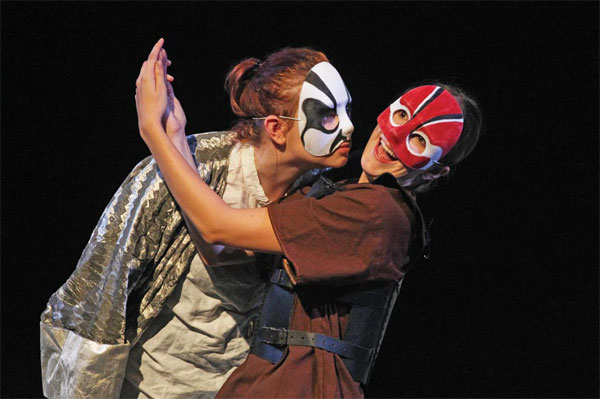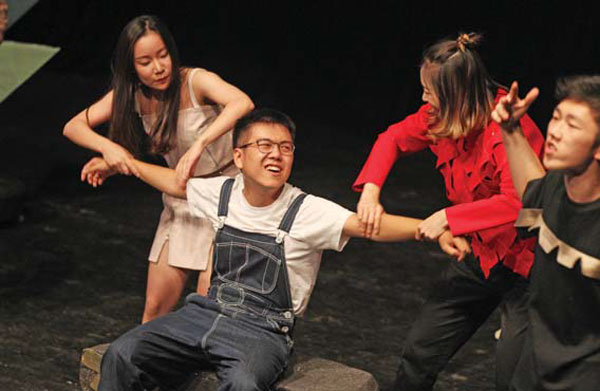Two classics, one dream
Updated: 2016-10-07 07:49
By Chen Nan(China Daily Europe)
|
|||||||||
Theater professor pulls back the curtain on stage production that combines masterpieces by Shakespeare and Tang Xianzu
Li Ruru didn't like Hamlet when she first read it. She was 11 at the time, and she recalls that the complicated relationships and tragic storyline were too much for her to comprehend.
Fifty years on, she teaches comparative and intercultural theater studies, including researching the works of Shakespeare.
Li, who earned bachelor's and master's degrees at the Shanghai Theater Academy, is now professor of Chinese theater studies at the University of Leeds, where she obtained her PhD in drama and theater in 1993.

|
Top and above: A Midsummer Night's Dreaming Under the Southern Bough featured young Chinese and British students, most of whom are not theater majors. Photos by Zhu Xingxin / China Daily |
For the past two years, the 64-year-old has been shaping an ambitious project - a stage production called A Midsummer Night's Dreaming Under the Southern Bough, which combines the 17th-century masterpieces of Shakespeare with works by Ming Dynasty (1368-1644) playwright Tang Xianzu. Both men died in 1616.
"I knew 2016 would be a great opportunity to celebrate these two literary giants. You can't wait for another 100 years," Li says. "For me, I want to introduce Chinese theater to foreign audiences because people don't know about it."
The collaboration comprises two parts: Chinese students from the University of International Business and Economics in Beijing interpret Shakespeare's A Midsummer Night's Dream, while students from Leeds University perform Tang's play Record of the Southern Bough.
The production premiered at Leeds University on July 27 before moving to the Edinburgh Festival Fringe. In September, it was staged in Shanghai and Beijing.

The run ended in Fuzhou, the birthplace of Tang in Jiangxi province, as part of a series of events to commemorate the Chinese and British playwrights.
When Li came up with the idea for the production, it was seen as unachievable. But she went ahead, even choosing to work with students who are not theater majors.
"The most interesting part of the project is to have young people without theater knowledge learn and perform works of Shakespeare and Tang," she says.
One of the most challenging parts was to shorten Tang's play, which is a 22-hour, 44-scene story about a drunken man's dream.
"It's the longest play I've ever read," says Adam Strickson, who helped to adapt Record of the Southern Bough. "We had to find what matters to the audience. So while retaining the differences, we look for what we have in common, such as where we go in life and the value of living in today's society."
Li Jun, who teaches European and American drama at UIBE in Beijing and co-wrote the script, says it's challenging for Chinese performers to make Shakespeare's A Midsummer Night's Dream relevant to a contemporary society.
"We made some changes to Shakespeare's original version from a Chinese perspective," Li Jun says. "For example, there are two men who love the same woman in the play, but we have two women who fall in love with the same man in our version. It's a way of showing the rise of women in Chinese society, with specific reference to young urban women."
Director Steve Ansell's journey with the project started in Shanghai when he first visited China in 2012. He first worked on Li Ruru's play The Sun Is Not For Us, which was inspired by her stepfather, playwright Cao Yu, and brought together characters and stories from his four most-famous works in a one-hour production.
"The 400th anniversary (of Shakespeare and Tang) presents the perfect opportunity to revisit, re-imagine and reposition Tang for audiences in China and the UK as a contemporary of Shakespeare and as a master storyteller in his own right," Ansell says.
Rachel Turner, a 21-year-old student of Leeds University, played three roles in Li Ruru's production. She decided to extend her stay in China for a year to study at Shanghai Theater Academy.
"This is a new experience for me, and I hope that this performance will be the start of joining our cultures as well as our societies," she adds.
chennan@chinadaily.com.cn
(China Daily European Weekly 10/07/2016 page20)
Today's Top News
Theresa May shifts her party toward the center
Security Council agrees on Guterres as next UN chief
Rudd says immigration speech not racist
West may be best for nation's teenagers
Trio wins Nobel chemistry prize for 'nano machines'
IMF sees Brexit damage to British growth
Three scientists share 2016 Nobel Prize in Physics
BRICS need to find their purpose again: O'Neill
Hot Topics
Lunar probe , China growth forecasts, Emission rules get tougher, China seen through 'colored lens', International board,
Editor's Picks

|

|

|

|

|

|








